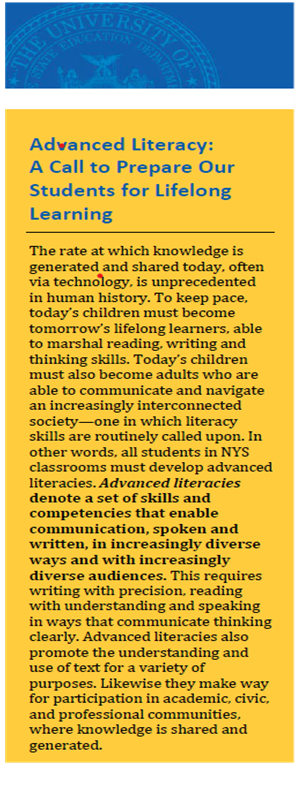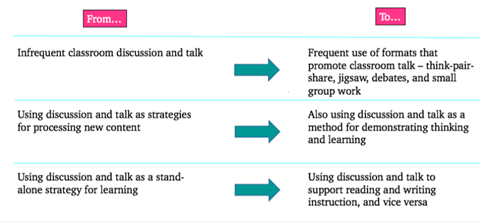By Roser Salavert, Ed.D.  Based on the most recent guidelines, the NYS Next Generation Learning Standards are expected to be implemented in 2022, and students will be assessed on them beginning in 2023. This article highlights a key change, i.e. the definition of being literate and outlines four key hallmarks that frame this new understanding and help teachers in their lesson planning and delivery. Advanced Literacy: The new definition for Literacy What does it mean to be literate today? The definition of literacy as “the ability to read and write,” that has been used for years and is still being used in many schools today but does not respond to the demands of a knowledge-based economy and information age society. According to the Oxford Dictionary (2018), literacy is now defined as “the ability to read and write, but also competence or knowledge in a specified area.” The rate at which knowledge is generated and shared today is unprecedented in human history and today’s children will face new demands for what it means to be literate. This realization was one of the major reasons for the revision of the NYS standards. Advanced Literacies is the goal of the Next Generation Learning Standards which aim at ensuring that all students from grades Pre-K to 12 have “the skills and competencies that enable communication, spoken and written, in increasingly diverse ways and with increasingly diverse audiences.” Advanced literacies also “promote the understanding and use of text for a variety of purposes. Likewise, they make way for participation in academic, civic, and professional communities, where knowledge is shared and generated.” (Introduction, NYS NGLS) Why do the revised Standards include Lifelong Practices of Readers and Writers? Due to the rapid and continuous generation of new knowledge, the NYS has framed the revised Standards within the context of learning practices that extend well beyond graduation, as qualities of “lifelong learning”. What is the role of literacy in content learning? The revised Standards also acknowledge that literacy is fundamental to learning across disciplines and that the development of advanced literacies is a shared responsibility. To that purpose, “the ELA standards have been designed to connect with and support the knowledge and learning standards of the other content areas” (Introduction, NYS NGLS). Instructional Guidelines (Hallmarks) Developing students’ advanced literacies and lifelong learning habits requires attention to the day-to-day instructional practices common to all disciplines. To support the schools in this effort, the NYS has developed the following guidelines or hallmarks. Hallmark 1: Work with engaging texts that feature big ideas and rich content
Hallmark 2: Build both conversational and academic language and knowledge. Developing communication confidence and a rich academic language requires being purposeful and strategic. The diagram from the NYS Brief, Hallmark 2 illustrates it as follows: Hallmark 3: Write to build language and knowledge.
Hallmark 4: Study high utility vocabulary words and academic language structures to build breadth and depth of knowledge
Source: http://www.nysed.gov/next-generation-learning-standards The Fordham PDRC will be offering live webinars on the NYS Next Generation Learning Standards starting in January 2022, so please stay tuned to our webinar updates. As part of this grant, the Fordham PDRC is also offering in-person professional development which is free of charge. Please contact us at [email protected] if you would like to be a host of in-person professional development.
0 Comments
Your comment will be posted after it is approved.
Leave a Reply. |
Archives
January 2024
Categories
All
|

